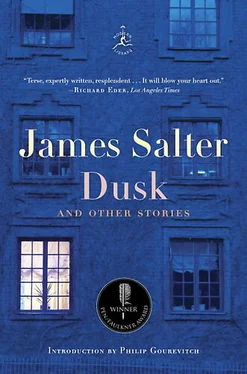“But what a face,” Guivi said.
“Her eyes!”
“There is a little touch of the idiot in them, isn’t there?” Guivi said.
She could see them talking. Afterward she sent someone to Lang. Whatever he had told Guivi, she wanted to know, too. Lang looked over at her. She was ignoring him.
He was confused, he did not know if it was serious. The minor actors with nothing to do were sitting on two old sofas. The floor was chalky, dust covered their shoes. Iles was following the scenes closely, nodding his approval, yes, yes, good, excellent. The script girl walked behind him, a stopwatch around her neck. She was forty-five, her legs ached at night. She went along noting everything, careful not to step on any of the half-driven nails.
“My love,” Iles turned to her, he had forgotten her name. “How long was it?”
They always took too much time. He had to hurry them, force them to be economical.
At the end, like school, there was the final test. They seemed to do it all perfectly, the gestures, the cadences he had devised. He was timing them like runners. Two hours and twenty minutes.
“Marvelous,” he told them.
That night Lang was drunk at the party the producer gave. It was in a small restaurant. The entry was filled with odors and displays of food, the cooks nodded from the kitchen. Fifty people were there, a hundred, crowded together and speaking different languages. Among them Anna shone like a queen. On her wrist was a new bracelet from Bulgari’s, she had coolly demanded a discount, the clerk hadn’t known what to say. She was in a slim gold suit that showed her breasts. Her strange, flat face seemed to float without expression among the others, sometimes she wore a faint, a drifting smile.
Lang felt depressed. He did not understand what they had been doing, the exaggerations dismayed him, he didn’t believe in Iles, his energies, his insight, he didn’t believe in any of it. He tried to calm himself. He saw them at the biggest table, the producer at Anna’s elbow. They were talking, why was she so animated? They always come alive when the lights are on, someone said.
He watched Guivi. He could see Anna leaning across to him, her long hair, her throat.
“It’s stupid to be making it in color,” Lang said to the man beside him.
“What?” He was a film company executive. He had a face like a fish, a bass, that had gone bad. “What do you mean, not in color?”
“Black and white,” Lang told him.
“What are you talking about? You can’t sell a black and white film. Life is in color.”
“Life?”
“Color is real,” the man said. He was from New York. The ten greatest films of all time, the twenty greatest, were in color, he said.
“What about…” Lang tried to concentrate, his elbow slipped, “ The Bicycle Thief ?”
“I’m talking about modern films.”
Today was sunny . He was writing in brief, disconsolate phrases. Yesterday it rained, it was dark until late afternoon, the day before was the same . The corridors of the Inghilterra were vaulted like a convent, the doors set deep in the walls. Still, he thought, it was comfortable. He gave his shirts to the maid in the morning, they were back the next day. She did them at home. He had seen her bending over to take linen from a cabinet. The tops of her stockings showed—it was classic Buñuel—the mysterious white of a leg.
The girl from publicity called. They needed information for his biography.
“What information?”
“We’ll send a car for you,” she said.
It never came. He went the next day by taxi and waited thirty minutes in her office, she was in seeing the producer. Finally she returned, a thin girl with damp spots under the arms of her dress.
“You called me?” Lang said.
She did not know who he was.
“You were going to send a car for me.”
“Mr. Lang,” she suddenly cried. “Oh, I’m sorry.”
The desk was covered with photos, the chairs with newspapers and magazines. She was an assistant, she had worked on Cleopatra, The Bible, The Longest Day . There was money to be earned in American films.
“They’ve put me in this little room,” she apologized.
Her name was Eva. She lived at home. Her family ate without speaking, four of them in the sadness of bourgeois surroundings, the radio which didn’t work, thin rugs on the floor. When he was finished, her father cleared his throat. The meat was better the last time, he said. The last time? her mother asked.
“Yes, it was better,” he said.
“The last time it was tasteless.”
“Ah, well, two times ago,” he said.
They fell into silence again. There was only the sound of forks, an occasional glass. Suddenly her brother rose from the table and left the room. No one looked up.
He was crazy, this brother, well, perhaps not crazy but enough to make them weep. He would remain for days in his room, the door locked. He was a writer. There was one difficulty, everything worthwhile had already been written. He had gone through a period when he devoured books, three and four a day, and could quote vast sections of them afterward, but the fever had passed. He lay on his bed now and looked at the ceiling.
Eva was nervous, people said. Of course, she was nervous. She was thirty. She had black hair, small teeth, and a life in which she had already given up hope. They had nothing for his biography, she told Lang. They had to have a biography for everybody. She suggested finally he write it himself. Yes, of course, he imagined it would be something like that.
Her closest friend—like all Italians she was alert to friends and enemies—her most useful friend was a hysterical woman named Mirella Ricci who had a large apartment and aristocratic longings, also the fears and illnesses of women who live alone. Mirella’s friends were homosexuals and women who were separated. She had dinner with them in the evening, she telephoned them several times a day. She was a woman with large nostrils and white skin, pale as paper, but she was still able to see white spots on it. Her doctor said they were a circulatory condition.
She was working on the film, like Eva. They talked of everyone. Iles: he knew actors, Mirella said. Whichever ones were brought in, he chose the best, well, he had made one or two mistakes. They were eating at Otello’s, tortoises crawled on the floor. The script was interesting, Mirella said, but she didn’t like the writer, he was cold. He was also a frocio , she knew the signs. As for the producer… she made a disgusted sound. He dyed his hair, she said. He looked thirty-nine but he was really fifty. He had already tried to seduce her.
“When?” Eva said.
They knew everything. They were like nurses whose tenderness was dead. It was they who ran the sickhouse. They knew how much money everyone was getting, who was not to be trusted.
The producer: first of all he was impotent, Mirella said. When he wasn’t impotent, he was unwilling, the rest of the time he didn’t know how to go about it and when he did, it was unsatisfactory. On top of that, he was a man who was always without a girl.
Her nostrils had darkness in them. She expected waiters to treat her well.
“How is your brother?” she said.
“Oh, the same.”
“He still isn’t working?”
“He has a job in a record shop but he won’t be there long. They’ll fire him.”
“What is wrong with men?” she said.
“I’m exhausted,” Eva sighed. She was haggard from late hours. She had to type letters for the producer because one of his secretaries was sick.
“He tried to make love to me, too,” she admitted.
“Tell me,” Mirella said.
Читать дальше












